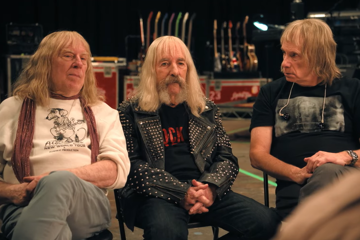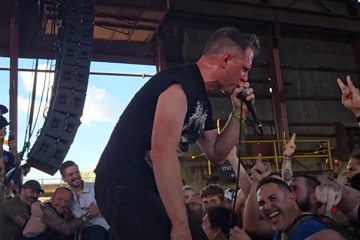Moura Reveals Human Side Of World's Most Notorious Drug Lord, Pablo Escobar
"The powerful Pablo you saw in the first season is not the man you see in these new episodes."
The rags-to-riches-to-the-grave (spoiler, I guess) saga of notorious drug lord Pablo Escobar, the man who basically invented the narcotics cartel, is one that's proven irresistible to storytellers of all stripes. It's little wonder, given that Pablo himself - a cruel but charismatic operator - is the kind of character toward which actors find themselves drawn. He's been played onscreen by more than a dozen different performers (if you're counting the ill-fated attempt by Entourage's Vinnie Chase, that is), but as talented as many of these men are it's fair to say that Brazilian actor Wagner Moura is responsible for the most compelling portrayal of Escobar to date.
Moura is one of the leads in Narcos, the Netflix series chronicling the rise of the multibillion-dollar drug trade in the South American country of Colombia and the Drug Enforcement Administration's desperate attempts to stem the rising tide of cocaine and the ruthless organisations behind its manufacture and distribution. It's a compelling drama, one that navigates the byzantine world on both sides of the law with ballsy energy, and Moura's work as Escobar is its rock-solid foundation.
"It's a very recent story in their lives - people of my age and around my age, they remember the bombings and the kidnappings and the killings."
With the first season of the series now available on DVD and Blu-ray, and the second season premiering in its entirety on Netflix on 2 Sep, now is the perfect time to binge on Narcos, which is almost as addictive as the drug at the core of its story (but not nearly as bad for your physical or financial wellbeing).
Don't miss a beat with our FREE daily newsletter
Moura was not fluent in Escobar's native tongue of Spanish when he first heard about Narcos from its producer-director Jose Padilha, his long-time friend and collaborator. To remedy this, he travelled to the Colombian city of Medellin - Escobar's old stomping ground - not only to pick up the language but to also soak up some impressions of the man he hoped to play (it wasn't long before Padilha sold the rest of the Narcos team on Moura). Spending time in the city and its surrounds gave the actor plenty of insight into who Escobar was and what he meant to Colombia.
"The history of Colombia is divided into the time before Pablo Escobar and after," says 40-year-old Moura. "Colombians have a very precise and accurate understanding of who Pablo Escobar was and how bad he was. It's a very recent story in their lives - people of my age and around my age, they remember the bombings and the kidnappings and the killings. Everyone knows someone who was killed; they know better than anyone in the world how bad he was."
At the same time, Escobar funnelled a lot of his ill-gotten gains into food, housing and medicine for the poorer citizens of Colombia, making himself something of a folk hero in the process.
"You can't judge these people for feeling that way," says Moura. "People historically forgotten by the authorities will have admiration for someone who shelters them or feeds them...this happens all the time in places throughout South America and in the Brazilian favelas."
"In Colombia there's a huge gap between the people who have nothing and the 1% that has everything. It's a tough barrier to break through, but Pablo did it."
It's this combination of benevolence and malevolence that has helped create the cult of personality that still surrounds Escobar two decades after his death at the hands of Colombian police, and Moura believes it's incorrect to view it as hypocrisy on Escobar's part.
"He had political ambitions, so he wanted the votes of the people he helped out," he says. "But at the same time, Pablo came from a very poor family, and in Colombia there's a huge gap between the people who have nothing and the 1% that has everything. It's a tough barrier to break through, but Pablo did it. You can do it by being a soccer player or a musician or you can do it by being someone like Pablo Escobar, but you can't really do it in a conventional way. What Pablo did with his charities and his good deeds in Medellin, he did out of political interest - he wanted their votes - but he was also part of their situation, and he had empathy for those people. He hated the Colombian elite."
Indeed, Escobar was keen to bring about systemic change in his country - "He wanted to be president of Colombia," says Moura - but he was also out to turn a tidy profit by any means necessary.
"What I tried to do - and what I try to do with any character, fictional or not - is look at him as a human being. He was powerful and, yes, he was cruel, perhaps one of the cruellest people to ever live. But he was a family man who loved his kids. He was a good friend, a good son; he was good to the poor people of his community."
The first season of Narcos covered 15 years in the rise of the drug trade and the rise of Pablo Escobar; the second season, says Moura, is "less epic but more dramatic", focusing on the last year of Escobar's life.
"It's more focused on the conflict between characters, not only Pablo but the DEA guys, who become so obsessed with getting Pablo they start becoming more like Pablo in their methods," says Moura. "The powerful Pablo you saw in the first season is not the man you see in these new episodes - he's losing everything."
Moura chuckles. "It's really cool."







